The Look
明けましたお目出度う y'all! That's "happy new year" for those who can't read Japanese.
Here's an email I got recently.
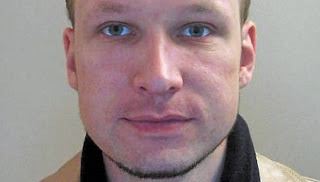
Attached is a picture of Behring Breivik, the guy who shot, bombed and killed about 77 people in Norway this summer. He has been examined by psychiatrists and they have come to the conclusion that he is/was a paranoid schizophrenic, meaning he was insane at the time of his murderous actions.
But look at his picture closely, look at his eyes...he is very balanced according to the Tibetan theory of "eye science."
I sometimes ask myself if this means that Hitler, Stalin, Osama and all other crazy wackos are also just paranoid schizos then?
So are these people really just sick or are they just simply "evil" ? This guy Behring Breivik planned and planned and worked at this for years and went to such lengths to kill these people that it is very hard for me to consider him sick, as most healthy and very intelligent people would not have managed the task of producing, orchestrating and manifesting such a killing even if they wanted to. Should that not say something about his sanity?
I think this is a really important question. And to me the question is, What is sanity and how does it relate to Enlightenment?
I think it's clear that there is no real correlation between I.Q. and morality. Some of the most immoral people in history have been extremely intelligent as measured by the accepted standards of measuring such things. Several of the people who followed Shoko Asahara's orders and placed poison gas on the Tokyo subway system were highly educated. Many of the top leaders of the Nazi party were also very brainy.
This means that the ability to carefully plan out and execute some specific operation does not relate at all with being a moral person. It is quite possible to create a very complex proceedure and to carry it out without having any sense of morality. Whatever you think really happened in Lower Manhattan on the morning of September 11, 2001, it was clear proof that planning and executing complex schemes does not require any sense of morality. Whoever did that stuff was very smart. I'm sure they all knew how to conduct themselves socially and be accepted as sane. If not, they wouldn't have been able to interact with the many people they needed to deal with in order to accomplish their goal. These were not raving lunatics. They never are...
But one would expect that enlightenment in the Buddhist sense would correlate with morality and just basic human decency. This is where things get tricky. Because it all depends on how one defines enlightenment.
The general consensus seems to be that an enlightened person is one who has undergone what they call an "enlightenment experience." This experience reveals to the enlightened person the true nature of reality. After having had this experience, the person is transformed into something more than what he or she was before.
But I suspect there is precious little more correlation between true morality and the ability to have one of these so-called "enlightenment experiences" than there is between true morality and the ability to score high on an I.Q. test.
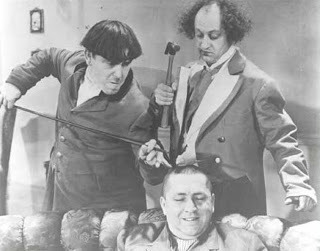 OK. I'll back off a little there. At some level an "enlightenment experience" shows the person who has it the real meaning of moral action — that anything one does to another person is something one does to oneself. And I don't mean this in any kind of figurative or metaphorical sense. I mean that when Moe hits Curly on the head with a sledgehammer, Moe is really only hitting Moe on the head with a sledgehammer. It only appears to be Curly getting hit.
OK. I'll back off a little there. At some level an "enlightenment experience" shows the person who has it the real meaning of moral action — that anything one does to another person is something one does to oneself. And I don't mean this in any kind of figurative or metaphorical sense. I mean that when Moe hits Curly on the head with a sledgehammer, Moe is really only hitting Moe on the head with a sledgehammer. It only appears to be Curly getting hit.
But that's not always what gets labeled as an "enlightenment experience." Often what passes for an "enlightenment experience" is something quite different. Sometimes it's much more like a drug-induced hallucination. People on psychedelic drugs often report feeling at one with the universe. But it's not the same kind of oneness. It's a oneness in which the experiencer owns that oneness and incorporates it into his/her sense of self, thereby making that sense of self infinitely big and infinitely exclusive.
Even if an "enlightenment experience" is genuine, the ego is very powerful and exceedingly clever. Absolutely anything, even a true experience of oneness with all things, can be transformed into something the ego can use to bolster itself.
As for the ability to achieve the stereotypical "look" that a realized master is supposed to have, this is even less correlated with morality or even with enlightenment. A decent actor can convincingly act out a variety or roles even when the actor has not experienced anything like what the character he's portraying is supposed to have experienced. It's easy to look the part of the balanced guru without being the least bit balanced.
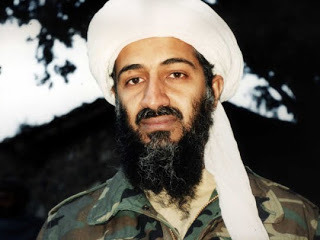
Osama bin Laden could do it.
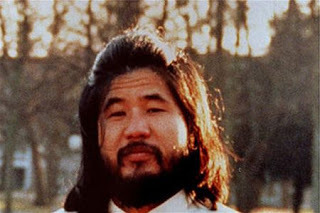
Shoko Asahara can do it.
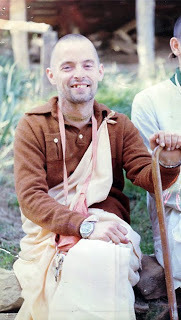
Kirtanananda Swami Bhaktipada, who allegedly ordered several killings on the New Vrindaban Hare Krishna farm community could do it.
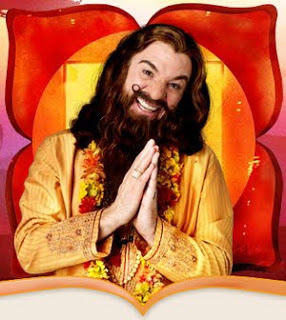
I suspect that Mike Myers can do it but refrained from doing it lest he look too much like his buddy...
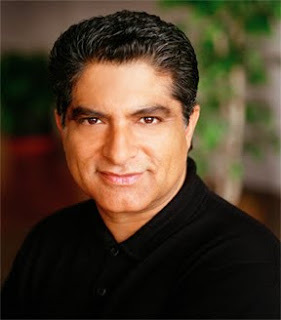
...Deepak Chopra who has really got it down!
Which isn't to say Deepak is anything like Osama bin Laden, Shoko Asahara and Kirtananda. I don't think he is at all. But that beatific grin he's mastered doesn't prove it.
So sanity is something quite difficult to define. Like the famous quote about pornography, "you know it when you see it." But you don't know it just because someone looks the way the media tells you they're supposed to. It's much more subtle.
And people are uncomfortable with that. They want easy definitions that never change. Unfortunately, in real life easy definitions that never change are hard to come by. They want stereotypes that are reliable. But stereotypes are never reliable.
Here's an email I got recently.

Attached is a picture of Behring Breivik, the guy who shot, bombed and killed about 77 people in Norway this summer. He has been examined by psychiatrists and they have come to the conclusion that he is/was a paranoid schizophrenic, meaning he was insane at the time of his murderous actions.
But look at his picture closely, look at his eyes...he is very balanced according to the Tibetan theory of "eye science."
I sometimes ask myself if this means that Hitler, Stalin, Osama and all other crazy wackos are also just paranoid schizos then?
So are these people really just sick or are they just simply "evil" ? This guy Behring Breivik planned and planned and worked at this for years and went to such lengths to kill these people that it is very hard for me to consider him sick, as most healthy and very intelligent people would not have managed the task of producing, orchestrating and manifesting such a killing even if they wanted to. Should that not say something about his sanity?
I think this is a really important question. And to me the question is, What is sanity and how does it relate to Enlightenment?
I think it's clear that there is no real correlation between I.Q. and morality. Some of the most immoral people in history have been extremely intelligent as measured by the accepted standards of measuring such things. Several of the people who followed Shoko Asahara's orders and placed poison gas on the Tokyo subway system were highly educated. Many of the top leaders of the Nazi party were also very brainy.
This means that the ability to carefully plan out and execute some specific operation does not relate at all with being a moral person. It is quite possible to create a very complex proceedure and to carry it out without having any sense of morality. Whatever you think really happened in Lower Manhattan on the morning of September 11, 2001, it was clear proof that planning and executing complex schemes does not require any sense of morality. Whoever did that stuff was very smart. I'm sure they all knew how to conduct themselves socially and be accepted as sane. If not, they wouldn't have been able to interact with the many people they needed to deal with in order to accomplish their goal. These were not raving lunatics. They never are...
But one would expect that enlightenment in the Buddhist sense would correlate with morality and just basic human decency. This is where things get tricky. Because it all depends on how one defines enlightenment.
The general consensus seems to be that an enlightened person is one who has undergone what they call an "enlightenment experience." This experience reveals to the enlightened person the true nature of reality. After having had this experience, the person is transformed into something more than what he or she was before.
But I suspect there is precious little more correlation between true morality and the ability to have one of these so-called "enlightenment experiences" than there is between true morality and the ability to score high on an I.Q. test.
 OK. I'll back off a little there. At some level an "enlightenment experience" shows the person who has it the real meaning of moral action — that anything one does to another person is something one does to oneself. And I don't mean this in any kind of figurative or metaphorical sense. I mean that when Moe hits Curly on the head with a sledgehammer, Moe is really only hitting Moe on the head with a sledgehammer. It only appears to be Curly getting hit.
OK. I'll back off a little there. At some level an "enlightenment experience" shows the person who has it the real meaning of moral action — that anything one does to another person is something one does to oneself. And I don't mean this in any kind of figurative or metaphorical sense. I mean that when Moe hits Curly on the head with a sledgehammer, Moe is really only hitting Moe on the head with a sledgehammer. It only appears to be Curly getting hit.But that's not always what gets labeled as an "enlightenment experience." Often what passes for an "enlightenment experience" is something quite different. Sometimes it's much more like a drug-induced hallucination. People on psychedelic drugs often report feeling at one with the universe. But it's not the same kind of oneness. It's a oneness in which the experiencer owns that oneness and incorporates it into his/her sense of self, thereby making that sense of self infinitely big and infinitely exclusive.
Even if an "enlightenment experience" is genuine, the ego is very powerful and exceedingly clever. Absolutely anything, even a true experience of oneness with all things, can be transformed into something the ego can use to bolster itself.
As for the ability to achieve the stereotypical "look" that a realized master is supposed to have, this is even less correlated with morality or even with enlightenment. A decent actor can convincingly act out a variety or roles even when the actor has not experienced anything like what the character he's portraying is supposed to have experienced. It's easy to look the part of the balanced guru without being the least bit balanced.

Osama bin Laden could do it.

Shoko Asahara can do it.

Kirtanananda Swami Bhaktipada, who allegedly ordered several killings on the New Vrindaban Hare Krishna farm community could do it.

I suspect that Mike Myers can do it but refrained from doing it lest he look too much like his buddy...

...Deepak Chopra who has really got it down!
Which isn't to say Deepak is anything like Osama bin Laden, Shoko Asahara and Kirtananda. I don't think he is at all. But that beatific grin he's mastered doesn't prove it.
So sanity is something quite difficult to define. Like the famous quote about pornography, "you know it when you see it." But you don't know it just because someone looks the way the media tells you they're supposed to. It's much more subtle.
And people are uncomfortable with that. They want easy definitions that never change. Unfortunately, in real life easy definitions that never change are hard to come by. They want stereotypes that are reliable. But stereotypes are never reliable.
Published on January 02, 2012 09:57
No comments have been added yet.
Brad Warner's Blog
- Brad Warner's profile
- 595 followers
Brad Warner isn't a Goodreads Author
(yet),
but they
do have a blog,
so here are some recent posts imported from
their feed.



